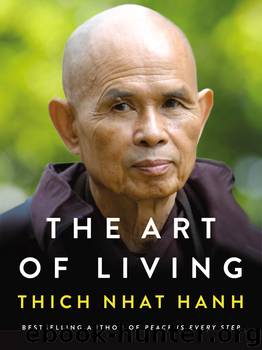The Art of Living by Thich Nhat Hanh

Author:Thich Nhat Hanh
Language: eng
Format: epub
Publisher: HarperCollins
Published: 2017-04-22T04:00:00+00:00
THE ACTION OF NON-ACTION
Sometimes, not doing anything is the best thing we can do. Non-action is already something. There are people who do not seem to do very much, but their presence is crucial for the well-being of the world. There may be someone in our own family who does not make a lot of money, and we could say they are not very active, but if that person wasn’t there, the family would be much less happy and stable because that person is contributing the quality of their being, their non-action.
Imagine a boat of desperate refugees crossing the ocean. The boat gets caught in a storm and everyone panics. If everyone panics, there’s a high chance they will do the wrong thing and the boat will capsize. But if just one single person can remain calm, they will be able to inspire others to be calm. If, from a place of peace, they ask everyone to sit quietly, the whole boat can be saved. That person doesn’t exactly do anything. What they contribute above all is their calmness and the quality of their being. That is the action of non-action.
As a society we are always striving to do things to resolve the many difficulties we face. And yet it seems that the more we do, the worse the situation gets. So we have to look into the ground of our actions, which is our quality of being.
In Plum Village we have organized retreats for Israelis and Palestinians. Back in the Middle East, their lives may be a daily struggle to survive. There is always something to do and not a moment to stop. But when they come to Plum Village, we create a peaceful environment for them to rest, stop, sit quietly, and come back to themselves. They just sit with us, walk with us, and eat with us. They practice deep relaxation. No one is doing anything special, yet it is already a revolution. After only a few days of practice, they feel a lot better. They have space inside, and they are able to sit there and listen to the suffering of the other side with compassion. Many young people on these retreats have told us that it was the first time in their lives that they believed peace was possible in the Middle East.
If we want to organize a peace conference or a conference on the environment, we can do it in the same way. World leaders can come together, not merely to sit around a table and make decisions, but to spend time together as friends and establish a human relationship. When we can listen deeply to each other’s suffering and difficulties, and when we can express our insights and ideas using loving speech, then our negotiations will be successful. Once there is understanding, releasing fear and anger becomes possible.
Restoring communication is the most
basic practice for peace.
We have to organize so there is enough time to live together peacefully, think peacefully, and act peacefully during the conference, in order to give rise to the kind of insight that our nations need.
Download
This site does not store any files on its server. We only index and link to content provided by other sites. Please contact the content providers to delete copyright contents if any and email us, we'll remove relevant links or contents immediately.
The Way of Zen by Alan W. Watts(6594)
Ego Is the Enemy by Ryan Holiday(5412)
The Art of Happiness by The Dalai Lama(4120)
The Book of Joy by Dalai Lama(3970)
Why Buddhism is True by Robert Wright(3446)
Spark Joy by Marie Kondo(3296)
Shift into Freedom by Loch Kelly(3192)
Happiness by Matthieu Ricard(3040)
A Monk's Guide to a Clean House and Mind by Shoukei Matsumoto(2901)
The Lost Art of Good Conversation by Sakyong Mipham(2639)
The Meaning of the Library by unknow(2563)
The Unfettered Mind: Writings from a Zen Master to a Master Swordsman by Takuan Soho(2294)
The Third Eye by T. Lobsang Rampa(2256)
Anthology by T J(2204)
Red Shambhala by Andrei Znamenski(2191)
The Diamond Cutter by Geshe Michael Roach(2058)
Thoughts Without A Thinker: Psychotherapy from a Buddhist Perspective by Epstein Mark(2010)
Twilight of Idols and Anti-Christ by Friedrich Nietzsche(1888)
Advice Not Given by Mark Epstein(1877)
